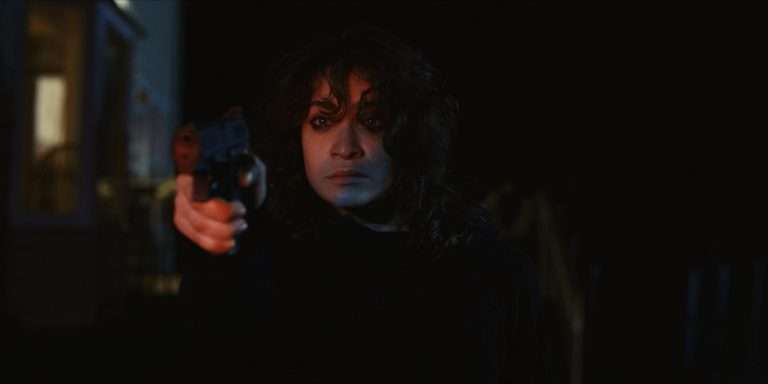Amalia Ulman’s “El Planeta” plays out like the mid-90’s American Indies that featured television-like screen transitions. It is not just a mere throwback but also a way to announce that Ulman is taking up pieces of cinematic history to fuel an original, black comedy about a mother and daughter refusing to accept their financial stance in post-crisis Spain.
Argentian artist Ulman is based in New York. However, she sets her monochromatic film in Gijón, Asturias – a small coastal town in Spain. Her reasons are pretty evident. The story scoops out of the desperate cross-roads that most small-town folks have to face. While the city is light and frothy in the summer – thanks to the tourists that come to the town to enjoy the beaches; it is brazen and deserted with almost no means of economic benefits year-round.
The opening sequence in “El Planeta” features Leonor (played by Ulman herself) meeting up with what looks like a potential client. She is ready to sleep with him and wants to know more about the arrangement. The client casually tells her that he likes to be pissed on. A similar sequence sees her asking a man for some money in exchange for a blowjob. She wants to buy a book she can’t seem to find at the library. These scenes are played out for laughs. However, Ulman makes sure that she steeps her tone in a slightly melancholic feeling. So that, we, as viewers understand the gravity of her situation.
Related to El Planeta – Judas and the Black Messiah [2021]: ‘Sundance’ Review – Daniel Kaluuya is electrifying in this powerful and relevant tale about the BPP
Simply put, the film is about the strange relationship that Leonor and her mother María (Ale Ulman) share. Leonor is a London-returned freelance stylist back in the town because of the death of her father. In grief and her inability to live a pristine life; Maria has resorted to either being at home while writing the names of her enemies on a small piece of paper as she freezes them later, or there are random rounds to her favorite stores as she tries to shoplift her way through. Basically, this is a film about a mother and daughter bonding with each other over shared tragedy.
Leonar, on the other hand, is out for love. Her few attempts at finding a semblance of affection in the shantytown are met with disappointments in married men looking for a young flame to quench their thirst. Her ticket way out of the place – a supposed skype call from a designer is deemed unnecessary when he tells her that she needs to have her own conveyance in order to take up the gig.

Ulman keeps her focus by setting the film in the post-crisis era in Spain. The 2018 Martin Scorsese’s references are specially put in to get the audience a sense of place in a town that can often be cited as something that gets stuck in time. A lot of people were hit by the economic crisis and while Ulman doesn’t really wish to give you a dose of realism, these themes are pretty evident.
Loosely based on her own experience with economic decline, the film is about how she and her mother had to face disparity in tough times. The mother-daughter relationship is also partly inspired by the “Las Falsas Ricas” (The Fake Rich) story, where a real-life mother-daughter duo posed as rich socialists, running up thousands of euros in local stores. They would ask the owner to add the bill up to the tab of a boyfriend who may or may not exist.
Since the film has an omnipresent relevance to Ulman’s own life – wherein both the mother and daughter had to face homelessness and hunger; the film feels quite relatable. She peppers her narrative with a quiet, understated, and deadpan tone, making her work feel original. There are slight investigations about identity and authenticity where Ulman explores why external appearances are considered an absolute finality. Cue to scenes that feature her bankrupt mother going into a posh boutique to get herself a dress and you get the drift.
Also, Read – The World to Come [2021]: ‘Sundance’ Review – A poetic telling of forbidden love marred by a lack of focus
“El Planeta” is a film about two people who use their shallowness to try and escape their situations. We don’t really get to know them up close but still, they seem like complex human beings struggling in their own ways, in spite of their efforts to avoid it. Ulman thus succeeds in evoking empathy for her characters rather than pitying their present situation.
Her complexities are also finely tuned with a rustic, transcendental yet quirky score by DJ Burke Battelle (who goes by the name ‘Chicken’ here). The scene transitions are categorically used to give this Black and White comedy a feeling of surreal ambiguity. But, what truly stands out here is the chemistry between the mother and daughter. Ale Ulman in her first acting role is just a treat to watch. The sequences that involve her just sitting and scraping up whatever food is sent their way are beautifully punctuated by a sort of obliviousness she has towards her situation. She is ready to embrace her prison life because she is someone who knows that a roof and food are the only things she desires in her life.
“El Planeta” is a dignified stance against a sort of inevitability in one’s life. It is what keeps most of us going. The Ulman’s are not familiar people, but their reasons – however insipid, feel believable.
★★★★
‘EL PLANETA’ PREMIERED AT THE 2021 SUNDANCE FILM FESTIVAL
CLICK HERE FOR OUR COMPLETE SUNDANCE COVERAGE
DIRECTOR/SCREENWRITER: Amalia Ulman
EDITOR(s): Katharine McQuerrey, Anthony Valdez
DOP: Carlos Rigo Bellver
MUSIC: Chicken
COUNTRY: Spain/USA
LANGUAGE: Spanish
RUNTIME: 82 MINUTES
LINKS: IMDB, ROTTEN TOMATOES



![50 Years Later: Flesh [1968]](https://79468c92.delivery.rocketcdn.me/wp-content/uploads/2018/09/vlcsnap-error218.jpg)


![Da 5 Bloods [2020] Netflix Review: Apocalypse is Now Exhumed](https://79468c92.delivery.rocketcdn.me/wp-content/uploads/2020/06/da-5-bloods-netflix-poster-spike-lee-social-768x448.jpeg)

![Four to Dinner [2022] Review: Little makes sense in this confusing tale of finding a soulmate](https://79468c92.delivery.rocketcdn.me/wp-content/uploads/2022/01/Four-to-Dinner-1-768x512.jpg)